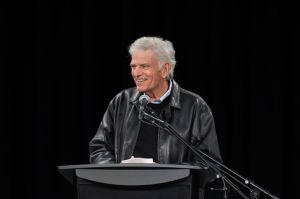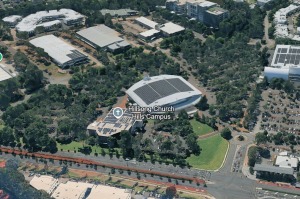An Easter People: The Centrality of the Resurrection
This Sunday Christians around the world will celebrate Easter as a memorial of Christ's resurrection. If Christians are correct about what happened on the first Easter morning, then the resurrection is the single most important event in human history. If true, then in this single event Christ's teachings were validated. He is the Son of God who came to earth as a sacrifice for our sins, and those who accept him by grace through faith will have eternal life. On the other hand, if the resurrection did not occur, then Christianity is a hoax and the claims of Christ were false.
According to some people today, however, whether or not the resurrection actually occurred is of little importance. Confronted with the bold truth claims of Jesus Christ—for example, "I am the way and the truth and the life. No one comes to the Father except through me." (John 14:6)—they try to obscure or avoid Christ's declaration by saying they simply revere him as a great moral teacher, nothing more. If archeologists unearthed Jesus' occupied tomb, it would not change their opinion of Christ at all.
Compare this mentality to that of the Apostle Paul: "...if Christ has not been raised, your faith is futile; you are still in your sins. Then those also who have fallen asleep in Christ are lost. If only for this life we have hope in Christ, we are to be pitied more than all men..." (1 Cor. 15:17-19) Paul understood the centrality of the resurrection to the Christian faith. He avowed, "...if Christ has not been raised, our preaching is useless and so is your faith." (1 Cor. 14:15) If all we have is this earthly existence, the Apostle affirms "let us eat and drink, for tomorrow we die." (1 Cor. 15:32) Paul understood clearly that ideas have consequences and that what we believe determines how we behave. If we believe that Christ is who he claimed to be and that he defeated death and the grave, we must live for him—in his presence, under his authority, and for his glory. But if all we have is this earthly existence, we might as well just live for ourselves because the grave is truly our final resting place.
In this age of relativism, tolerance, and inclusion, Christ's claims of absolutism and exclusivity make many uncomfortable. It is deemed to be in poor taste to assert that there is only one way to God. Therefore, acknowledging Jesus as a great moral teacher is a convenient way of partially embracing him, while at the same time keeping him at a distance. But Jesus doesn't allow us to have it both ways. Christ did not come to earth to merely usher in a new morality. C. S. Lewis explains, "...Christianity is not the promulgation of a moral discovery. It is addressed only to penitents, only to those who admit their disobedience to the known moral law." In other words, Christ did not come to teach morality to those who are ignorant of it. He did not come to offer a new moral law. He came to save those who had fallen short of the existing one. Ultimately, Christ came to save sinners. (1 Tim. 1:15)
The Scriptures teach that salvation comes through Christ's death, burial, and resurrection. In perfect, loving obedience to the Father's will, Christ bore the curse of man's sin. He paid the price of our salvation with his own death. Had the story ended there, one might think that God himself had been defeated, and that there is no hope for any of us. But the story does not end there. On Easter morning, light burst forth from the tomb. Christ conquered death and was risen to new life. Just as Jesus died a physical death, his physical body also rose again. It was the ultimate act of redemption, for in Christ's resurrection, all things were made new.
For Christians, then, there is eternal hope in the death and resurrection of Jesus. With Christ we die to our sins, and in Christ we rise to new life. Christ has promised to restore all things; there is hope even for our aching bones and wrinkled flesh in the resurrection of the body. In that one historical event—the most important event in human history, when Jesus' dead body was restored to life—the whole world was given hope that, in Christ, we too can live again. The reality of the resurrection is what prompted St. Augustine to declare, "We are an Easter people, and Alleluia is our song."
Had Christ simply told mankind of the many ways in which we all fall short of God's perfection, the life of Jesus would have brought only despair, not hope. Who could bear seeing the stark contrast between the perfection of God and the sinfulness of men? But Christ did not bring sorrow and despair, but hope. Our hope is an Easter hope: that in the face of death and deterioration, when confronted with the many sorrows of this world, Christ has triumphed over the grave. In conquering death, Christ promised to renew all things.
This is the one true and lasting hope. Without the resurrection, the Christian religion would be cruelly deceitful. And far from being a great moral teacher, Jesus would be a malicious charlatan.
During this Easter season, we do well to confront the claims of Jesus Christ. We should run with Peter and John to the tomb to see if it is really empty. If it is not, then we should grab all the gusto we can in order to anesthetize us from hopelessness and despair. If it is, we can sing "Alleluia!" for the curse has been broken, death has been defeated, and life eternal is available to those who believe.
God grant that we might proclaim with the apostles of old: "He is risen! With our own eyes we have seen it, he is risen indeed!" .
___________________________________________________
Ken Connor is Chairman of the Center for a Just Society in Washington, DC and a nationally recognized trial lawyer who represented Governor Jeb Bush in the Terri Schiavo case. Connor was formally President of the Family Research Council, Chairman of the Board of CareNet, and Vice Chairman of Americans United for Life. For more articles and resources from Mr. Connor and the Center for a Just Society, go to www.ajustsociety.org. Your feedback is welcome; please email info@ajustsociety.org.



























